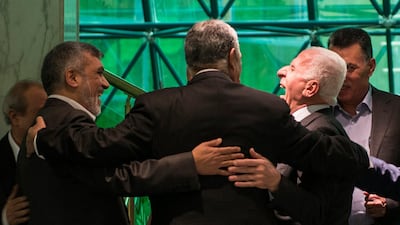After years of disagreement and disharmony, a glimmer of hope may have emerged for ordinary Palestinians. Officials have confirmed that a preliminary unity deal has been reached between Fatah and Hamas, which is still on the international terrorism blacklist. The agreement is an extraordinary and welcome breakthrough, as the two groups have been at odds since clashes between the pair broke out in 2007.
According to AFP, part of the initial agreement would ensure that forces from the West Bank-based Palestinian Authority would take control of the Rafah Border Crossing between Gaza and Egypt. So far so good.
_______________
Read more
Gaza Girls: Growing Up in the Gaza Strip - in pictures
How solar power is helping Gaza residents overcome electricity crisis
How young Palestinians lost faith in the old men of Fatah
_______________
That Hamas has agreed to relinquish some civil powers in Gaza to Fatah speaks to the current air of resignation that fills the Strip. The territory is almost unliveable for its two million inhabitants and conditions have crumbled at an alarming pace since Hamas took control a decade ago. Those who live there are starved of basic necessities, such as power and access to clean water. This appalling situation has only served Israel's strategic interests, while putting the prospect of a just and honest broader peace seemingly further out of reach.
But we have been here before. After all, Fatah and Hamas's last agreement to form a national reconciliation government in 2014 changed little, as Hamas's government continued to pull the strings in Gaza.
More tangible details of the deal made at the talks in Cairo will emerge over the coming days, although we do know already that it will cover a broad range of administrative issues, but it can only be held together if Hamas agrees to disarm, which is something it has refused to do, despite agreeing for its members to take on roles within the Palestinian Authority.
Egypt was right to actively take over the baton from Qatar and Turkey (both of which had strong self-interested agendas to push through trying to fortify Hamas) not least because it shares a border with Gaza. Cairo's active role in brokering an agreement has been seen by many commentators as the main source of momentum, as neither faction wanted to be seen as letting down negotiations.
And yet, even if all goes well on the ground and Hamas officials begin working under the wing of a unity deal, foreign aid donors and Israel will no doubt be scrutinising how Hamas's members are integrated into Palestinian ministries and what roles they will play. Commentators have already pointed to a legal conflict with those countries and organisations that deem Hamas a terrorist organisation.
In short, while the latest agreement may be a breakthrough, much stands to go wrong given the multi-dimensional nature of what has to be resolved. Only time will tell which whether pragmatism or politics will prevail.

